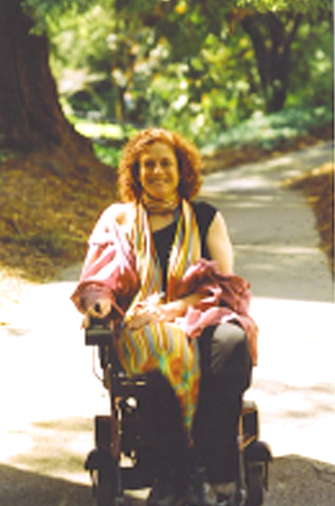 |
Lost and FoundBy Simi LintonOn a spring day in 1971, my husband, my best friend and I set off from Boston, bound for Washington, DC. We walked down the street together, we stood near the entrance to the Mass Pike, and in unison we thrust our thumbs out, looking for a ride. With each ride we got closer to Washington, but we never got there, and by the end of the day, my friend Carol was dead and my husband John, the ferociously smart man I'd married much too young, was in a coma he would never wake up from. I lay down the hall from him, tethered to tubes and machines, breathing hard to keep myself alive.
We had been on our way to Washington to protest the war in Vietnam. This was the demonstration that would end the war and we must voice our outrage. We all knew of men who had been killed, and of those who were wounded and wouldn't ever walk again, or hear again, or breathe properly. We were moved to go to that demonstration because it was spearheaded by returning vets. Angry at US policy and disillusioned by the reality of what they had witnessed, the Vietnam Veterans Against the War wanted the United States to know that they no longer believed this was a just war. I sustained an injury to my spine that immobilized my legs, spent months in the hospital and then more months in a rehab center, learning to use a wheelchair and learning to cope with the world in this new state I found myself in. The first day there, five or six young women and men, all in wheelchairs, came rolling into my room to greet me. "When will you get your chair?" someone asked, like it was something I should want. They soon left, talking loud, kidding around. Two guys tried to push their chairs out the door at the same time so they crashed into each other. "Fuck you," said one. "No, fuck you," said the other. I was left alone, wanting to be part of the group, wanting to move. I got the wheelchair, but it took a while to catch up to the others. Slowly I began to gain strength, move around a bit, and eat. Thick milkshakes, bread and butter, mashed potatoes. Treats were shared with roommates. We made each event in this sorry place as festive as possible. We were thrown in together and exposed in all that was sad and messy about our lives at that time. Our piss and our shit, our tears and our awkward visits with people who didn't know how to talk to us. I often brushed off people's kindness to me, showing an upbeat face, saying I was fine, no need to worry. But not always. My friend Kevin found me one day huddled in a vestibule outside the urologist's office, crying. A few weeks before, they had taken out my indwelling catheter, and I was trying hard to keep from peeing all over myself, but I couldn't hold back and there I was again, wet and sad. "Kevin," I sobbed "he told me that maybe it would get better, but if not I could wear a pad when I went out. I can't do that." Kevin said "Yeah," and pointed to the bulge in his pants leg where, as we both knew, there was a tube coming out of his penis, running down his leg, into a bag strapped to his ankle. But it was Kevin's turn to comfort me, and before long we were laughing at how much beer he'd drunk the night before to make his bag so fat. I slowly got stronger, learned how to use my chair and began making friends. We would race through the hallways, go to the snack bar - do anything just to move. On hot summer nights, we snuck bottles of scotch up to the roof, and some of us smoked reefer. In all that craziness, I recognized that something serious had happened to me and I was starting to feel like a more substantial person. A woman now, although no longer a married woman and no longer a walking woman, I was, mercifully, no longer a girl. All the people who visited me since the accident had been told about it by someone else, but there was one friend who didn't know. One night, after everyone was in bed, I took a bunch of change down to the phone booth at the end of the hall and called Delia. I just plunged in and told her about the accident, about John and Carol, the plan to leave the hospital soon, stay on in New York and go back to college. I then said, "I'm OK, you know." "What?" she said, letting out a gasp, "Oh yeah, sure you're fine. John is dead. You're fucking paralyzed, you're in a fucking wheelchair, what do you mean, you're OK?" "But I am," I said. I woke from the nightmares, lived on the edge for a while, frail and hurting, dopey from rounds of painkillers and the numbing bleakness of hospital life. There were lumps and bumps and scars. But now, a few months later, I liked the same things, got outraged just the same, laughed at my sister's jokes, and still hated Nixon. I was scared of going back out into the world, a world I knew would not treat me well, but I was hungry for it. I laughed when Delia said "You're fucking paralyzed!" Everyone had been so nice, so tentative, like maybe I didn't know what had happened to me. If Delia could talk rough to me, I must be OK.
Simi Linton is a writer and filmmaker. Lost and Found is from her memoir My Body Politic (University of Michigan Press, 2006).
|


